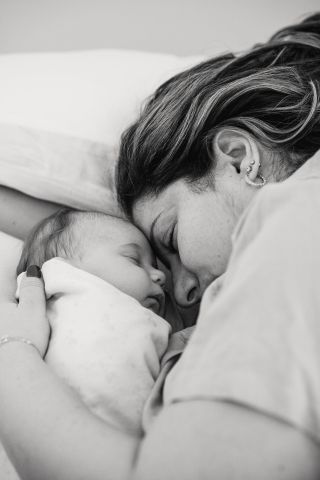Postpartum Depression
The Need for Universal Postpartum Depression Screening
The baby blues can be addressed earlier.
Posted January 11, 2024 Reviewed by Gary Drevitch
Key points
- Early screening for postpartum depression and anxiety can improve the lives of parents with young children.
- Postpartum depression and anxiety are a concern for biological and non-biological parents.
- Hospitals and birthing centers are ideal locations for such screenings, but they rarely do so.

Recently, I was looking at photos from when my girls were newborns. In all the photos, I am smiling and looking elated, and on so many levels, I was. But, I was also suffering from postpartum depression (PPD) and anxiety.
With my first daughter, I was terrified to leave the house. I was convinced I would drop her or a car would jump the curb and run into her stroller. In many ways, I was paralyzed by fear for her safety.
I expected to be more relaxed with my second child. But the same feelings of fear and dread crept in. My second one had to spend time in the neonatal intensive care unit (NICU), which exacerbated my feelings of anxiety and depression. Still, not all of them were related to her NICU stay. I was extremely anxious that I would not be able to keep both my children safe and that it would be too much for me.
I also became fearful for my older daughter’s safety, obsessing over who she was talking to on the phone. (It was COVID, so there was lots of phone usage for better or worse.) It was not until I began therapy with a psychologist and found a support group online that I felt better. Just knowing that many of my invasive thoughts and anxiety were postpartum-related helped me feel less lonely and afraid.
When leaving the hospital with both my girls, I was not given any screening for postpartum depression. In the case of my first daughter, I gave birth to her, while we adopted our second daughter. Having experienced postpartum depression as both a biological and non-biological parent, I am attuned to the need for screening for depression and anxiety for both partners.
As many as 20 percent of birthing parents experience postpartum depression, including approximately 7 to 9 percent of fathers—and approximately 10 to 12 percent of adopted parents experience postpartum (adoption) depression. Only eight states, however, require hospitals to screen mothers covered by Medicaid for PPD, and no states require it for non-birthing parents. Diagnosis is not enough, but it can be an important first step in providing support for those experiencing postpartum depression and anxiety.
Early intervention can be key to preventing symptoms from worsening. Further, finding a community of support also experiencing postpartum depression and anxiety can help with feelings of loneliness.
Encouraging hospitals to screen biological and non-biological parents at the hospital can be a first step in an important initiative to better support the mental health of parents with young children.


